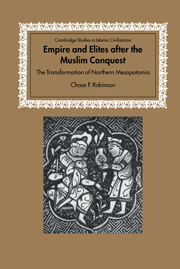Book contents
- Frontmatter
- Contents
- Preface
- Acknowledgements
- List of abbreviations
- Note on dates and citations
- Map: The Fertile Crescent in the early Abbasid period
- 1 Conquest history and its uses
- 2 The seventh-century Jazira
- 3 From garrison to city: the birth of Mosul
- 4 Christian élites in the Mosuli hinterland: the Shahārija
- 5 Islam in the north: Jaziran Khārijism
- 6 Massacre and narrative: the Abbasid Revolution in Mosul I
- 7 Massacre and élite politics: the Abbasid Revolution in Mosul II
- Conclusion
- Bibliography
- Index
- Other titles in the series
1 - Conquest history and its uses
Published online by Cambridge University Press: 13 August 2009
- Frontmatter
- Contents
- Preface
- Acknowledgements
- List of abbreviations
- Note on dates and citations
- Map: The Fertile Crescent in the early Abbasid period
- 1 Conquest history and its uses
- 2 The seventh-century Jazira
- 3 From garrison to city: the birth of Mosul
- 4 Christian élites in the Mosuli hinterland: the Shahārija
- 5 Islam in the north: Jaziran Khārijism
- 6 Massacre and narrative: the Abbasid Revolution in Mosul I
- 7 Massacre and élite politics: the Abbasid Revolution in Mosul II
- Conclusion
- Bibliography
- Index
- Other titles in the series
Summary
The literary material upon which one must base a seventh-and eighth-century history of the Jazira and Mosul generally dates from the ninth and tenth; with the exception of al-Azdī's history,it was also written by non-Jazirans and non- Mosulis. To use this material, which is clustered in accounts concerned with the conquests of the 630s and 640s, the two civil wars of the 650s and 680s, and the Abbasid Revolution of 750, we need to know something of how it came together and how it was understood. In general terms, the approach taken here is thus source and form critical, and if varieties of source and form criticism are hardly new to the field, the implications of much of this work continue to be wished away. In part this is because the criticism has more frequently served to undermine credulous reconstructions of the tradition than it has to erect sound reconstructions of its own. It is positive results that most historians want, however: Dennett's views on early Islamic taxation have staying power not so much because his criticisms of Becker were fatal, but rather because his reconstructions were put so boldly and concisely; Dennett was (and remains) extremely useful. If it is uncharitable to say that source and form criticism has been its own worst enemy, it remains fair to say that its tools must now be handled differently.
This is what I propose to do.
- Type
- Chapter
- Information
- Empire and Elites after the Muslim ConquestThe Transformation of Northern Mesopotamia, pp. 1 - 32Publisher: Cambridge University PressPrint publication year: 2000



